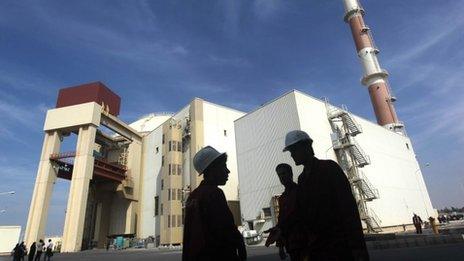Iran nuclear crisis: What are the sanctions?
- Published
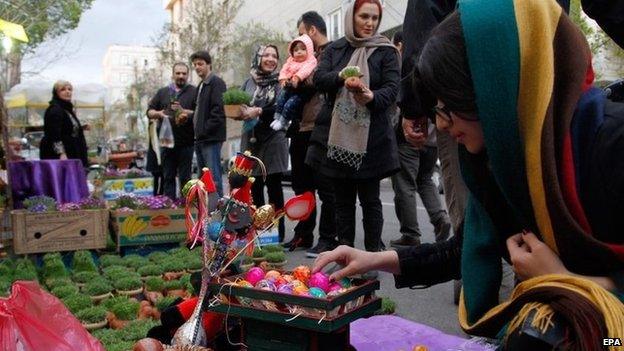
Sanctions have caused huge rises in inflation in Iran in recent years
Since Iran's nuclear programme became public in 2002, the UN, EU and several individual countries have imposed sanctions in an attempt to prevent it from developing military nuclear capability. Iran insists its nuclear activities are exclusively peaceful, but the world's nuclear watchdog has been unable to verify this.
Iran and world powers agreed an interim deal in 2013 which saw it gain around $7bn in sanctions relief in return for curbing uranium enrichment and giving UN inspectors better access to its facilities. World powers also committed to facilitate Iran's access to $4.2bn in restricted funds.

What do the sanctions entail?
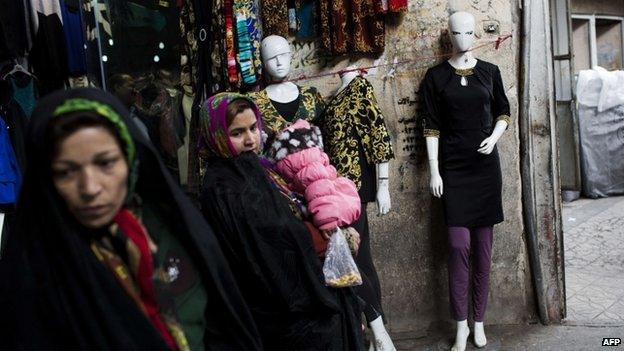
A 2013 poll found that 56% of Iranians thought sanctions had hurt livelihoods "a great deal"
Several rounds of sanctions in recent years have targeted Iran's key energy and financial sectors, crippling its economy.
The four rounds of UN sanctions included:
A ban on the supply of heavy weaponry and nuclear-related technology to Iran
A block on arms exports
An asset freeze on key individuals and companies.
The EU also imposed its own sanctions, among them:
Restrictions on trade in equipment which could be used for uranium enrichment
An asset freeze on a list of individuals and organisations that the EU believed were helping advance the nuclear programme, and a ban on them entering the EU
A ban on any transactions with Iranian banks and financial institutions
Ban on the import, purchase and transport of Iranian crude oil and natural gas - the EU had previously accounted for 20% of Iran's oil exports. European companies were also stopped from insuring Iranian oil shipments.
Japan and South Korea have also imposed sanctions similar to those of the EU.
As well as more recent sanctions aimed at Iran's financial, oil and petrochemical sectors, the US has imposed successive rounds of sanctions since the 1979 Tehran hostage crisis, citing what it says is Iran's support for international terrorism, human rights violations and refusal to co-operate with the IAEA.
The US sanctions prohibit almost all trade with Iran, making some exceptions only for activity "intended to benefit the Iranian people", including the export of medical and agricultural equipment, humanitarian assistance and trade in "informational" materials such as films.

What has been the effect of the sanctions in Iran?
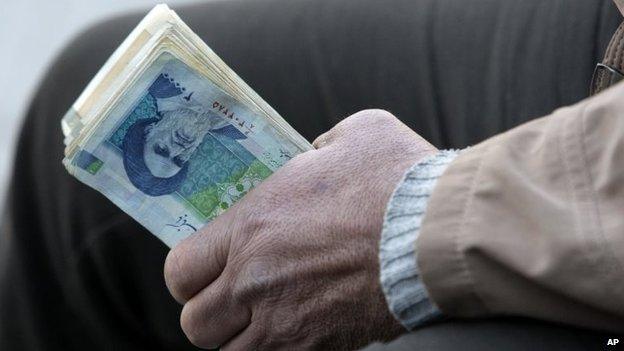
Iran's currency, the rial, lost two-thirds of its value against the US dollar as the sanctions took effect
As a result of the EU embargo and the US sanctions targeting other major importers, Iran's oil exports had fallen to 700,000 barrels per day (bpd) by May 2013, compared with an average 2.2 million bpd in 2011. In January 2013, Iran's oil minister acknowledged for the first time that the fall in exports was costing the country between $4bn and $8bn (£2.5bn-£5bn) each month. Iran is believed to have suffered a loss of about $26bn (£16bn) in oil revenue in 2012 from a total of $95bn (£59m) in 2011.
In April 2013, the International Monetary Fund (IMF) forecast that Iran's gross domestic product (GDP) would shrink by 1.3% in 2013 after contracting by 1.9% the previous year.
The White House estimated that Iran's oil exports would remain at a level of about one million bpd during the six months of the previous interim agreement. It estimated that Iran would accrue $1.5bn during that period from sales of petrochemicals, trading in gold and other precious metals, and the renewed transactions with foreign firms involved in the automotive sector.

How would lifting sanctions affect the Iranian economy?
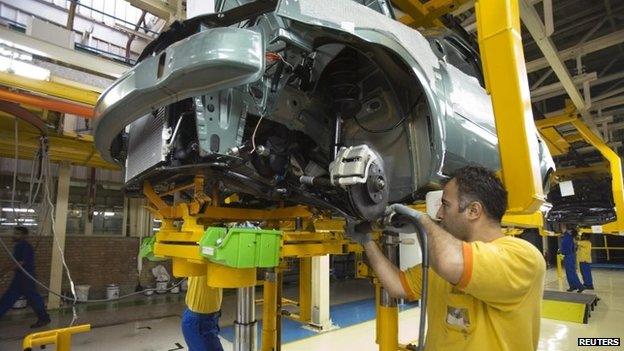
Iran's automotive industry has been badly affected by the international sanctions
The "P5+1" group (US, UK, France, Russia, China plus Germany) has said that in the event of a deal being reached, sanctions should be eased in a phased manner, with restrictions on imports of nuclear-related technology remaining for years.
Iran wants the UN sanctions suspended soon after any agreement is reached. The loss of oil revenue, which accounted for a half of government expenditure, and isolation from the international banking system, had caused Iran's currency, the rial, to lose two-thirds of its value against the US dollar and caused inflation to rise to more than 40%, with prices of basic foodstuffs and fuel soaring.
Many Iranians therefore see the lifting of the sanctions as an essential first step in improving the economy.
During his first election TV programme in 2013, Iranian President Hassan Rouhani was quoted as saying that "sanctions will... be resolved, and economic prosperity will also be created".
"I said it is good for centrifuges to operate, but it is also important that the country operates as well and the wheels of industry are turning," Mr Rouhani said, in a documentary broadcast in 2013.
- Published25 November 2014
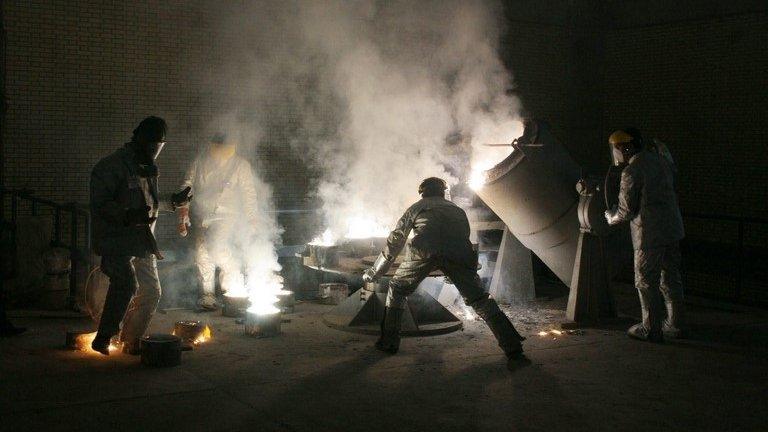
- Published9 November 2011
